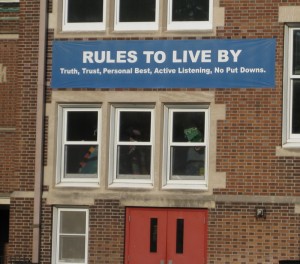Rand Paul, senate hopeful for Kentucky, made a fool of himself with remarks about the 1964 Civil Rights Act and racism and affirmative action et cetera et cetera so on and so forth. If Kentucky votes him into office, they get what they deserve. There was a brief moment when I thought Ron Paul was worthy of some respect—he seemed willing to speak truth to power. I found that I disagreed with him on specifics, but it is useful (and rare) to have someone doing the Emperor’s New Suit schtick.
However, anyone who names a child after an ideological demagogue has some serious problems with reality. (To be clear, Rand, under the circumstances, can only refer to Ayn Rand, the patron non-saint of the Libertarian Movement.)
Rand’s pronouncements about the rights of business owners to deny service to anyone they see fit is perfectly consistent with Randian philosophy and politics. Basically, it says that the person whose name is on the title owns what the title describes outright and has, by dint of absolute moral dictate, dictatorial command over said property and ought to be allowed to do with it what they wish. Without explanation to anyone and certainly without anyone else’s permission.
Sounds good, doesn’t it? I mean, you worked for it, you sweated, earned the means of acquisition, put your name and fortune on the line to own it, worked to make it do what you intended, you should therefore enjoy all rights and privileges in the say of what to do with it. Your home, your rules. There’s a feel-good quid pro quo to it that appeals a basic sense of fairness, suggests a rough equivalence between work and risk and rights.
This is fundamental to Ayn Rand’s whole premise, that the creator, the mind behind creation, the one who brings something into existence is the one who has the only natural say in what that thing so created can and will do and who it shall serve. For an avowed atheist, Rand had a very mythic, godlike attitude toward life.
And I suppose if you could somehow make the case that a single individual did indeed create something from whole cloth and by virtue of his or her singular efforts sustained it and drove it and made it successful, there might be a good and valid point to this view.
But is that ever the case?
Rand’s famous tome, Atlas Shrugged, makes the argument that the movers and shakers, the people who Do, are absolutely vital to the world. Nothing would exist without them and if they should withdraw their talent and genius and effort, the world would come to a halt. She makes the case for the Indispensible Man. And in the novel (for those of you who have not read it), a man named John Galt, fed up with the growing People’s Movements around the world, which he sees as essentially parasitic, calls a strike of the truly important people. He convinces the men and women who truly matter to leave the world, retire, disappear, and when they have all left, it seems no one can do what they did, and everything falls apart. The final image shows them emerging from their high-tech hideaway to assume command as the true and rightful aristocracy of ability.
It is, in her narrative, a very small group.
[More . . . ]


